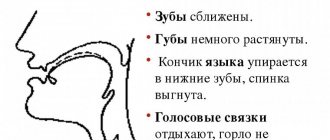dolio.ru » Tips » How to make your voice rougher and more respectable and learn to speak correctly
It is not for nothing that people occupy the highest level of development among all living beings. They invented and throughout their existence have been constantly improving one of the most effective tools of communication - speech. It is difficult to argue with the fact that the sound and timbre of the voice greatly determines how others perceive the person and everything he says.
Sometimes it happens that a too thin, gentle or ringing voice distorts the impression of what a particular subject said. For anyone who speaks in a nasal, squeaky or childish manner, this quality becomes a real punishment. However, you should not panic or get upset prematurely. Instead, you should try several ways to make your voice rougher and a little muffled. This is not about computer sound processing or special programs that distort media waves, but about home remedies for changing the range of throat sounds that a person makes.
Have you been interested in voice training for a long time?
Are you interested in voice training for speech or vocal lessons?
Do you want to make your voice more confident, strong and beautiful, learn to sing from scratch, improve your diction?
Thanks to the Natural Voice School, this is possible at home, via the Internet, using video lessons with feedback and teacher support!
Also, you can undergo voice training in St. Petersburg and Moscow.
Voice settings
Setting up your voice is the very first step. Imagine, you begin to sound, do exercises, and feel how your voice acquires volume, depth, strength!
Your voice begins to sound free, easy, confident! And at the same time, it is beautiful and pleasant for your listeners. You begin to feel the vibrations from your voice throughout your body - this, by the way, is also very good for your health!
And finally, when you feel that your voice has opened up and your inner world is reflected in its sound, you can move on to the next stage!
Performing Arts
By performance I mean the following:
- The ability to speak beautifully.
- Ability to conduct business negotiations.
- Ability to speak in public.
- Ability to make toasts.
- Ability to give compliments.
- Etc.
Singing Songs is a separate section of performing arts, which especially requires a perfectly tuned voice - the BASE, the foundation on which you can build a truly reliable and beautiful house!
Voice Exercises: Voice Range
Published: October 24, 2017
Hello, friends!
Now about the vocal range. There are three types of range:
1. Sound pitch. This is the distance from the lowest to the highest note you can sound. Measured in octaves. If you have never studied voice, your pitch range is just over an octave or one and a half octaves. As you begin to practice, the range increases up and down and reaches a minimum of two octaves. Typically more. This helps you sing songs that you previously couldn't sing because the notes were too high or too low.
2. Emotional. This is a set of emotional colors that sound in your voice. Emotional palette. The wider your emotional range, the more accurately you can convey a song or public speech to the listener.
3. Characteristic. It's a set of characters that come out in your voice. While you are not working with your voice, your character at the moment is manifested in it. But when you start doing the exercises, you may hear voices in your voice that are not typical for you personally. For example, the voices of villains or sages. Or maybe children's voices. Or the village voices of workers. And this has nothing to do with acting, although real actors have an excellent command of their range of characters. But these are all the characters inherent in your ancestors. Your “native” characters, and giving them the opportunity to sound and sing with them is useful from the point of view of strengthening your own voice, character and health. It's a little confusing, next time I'll try to make it simpler.
In the video I give two exercises to expand the pitch range. So that you can sing higher and lower notes more easily. Start doing it, and within two to three weeks you will be able to sing those songs that were previously difficult for you because the notes were too high or low.
Let me remind you that the “School of Natural Voice” is not only about singing. Or rather, it’s not about singing at all, although we do have video training on learning to sing from scratch (“Singing with a natural voice”). First of all, “School of Natural Voice” is about voice!
And the voice is an instrument. And for singing, and for communication, and for self-realization. And to improve health. And for relaxation, recuperation, stress relief.
The voice is one of the most important tools for achieving success in life.
We talk about all this in detail and perform the whole range of exercises for tuning the voice at the “Revival of the Natural Voice” training.
Sign up while there are still spaces available. There is a discount on training in St. Petersburg if you pay before the end of October! There's a week left.
December 2-3, Moscow, sign up for training December 9-10, St. Petersburg, sign up for training
See you!
UNLOCK THE NATURAL BEAUTY AND POWER OF YOUR VOICE
Your contact information will never be passed on to third parties!Privacy Policy
Exercise with the sound “I”
Take the starting position: standing or sitting. Do a downward tilt of your head so that your chin is tucked toward your chest, as in “Bass Head,” and then make the lowest “I” sound. After this, slowly raise your head up as far as it will go, trying to fix the pitch of the sound.
At first, keeping the “I” sound fixed will be problematic, and its pitch will gradually increase as the head rises upward. This is an indication that your ligaments are tight and your larynx is shortening. Perform the exercise several times a day until the pitch of the sound becomes even in any position of the head. Achieving this result can be considered a complete relief of spasm of the vocal cords.
These exercises should be enough, but I would like to give a few more important tips.
A few tricks to make your voice hoarse:
- Scream loudly and long
For example, at a city football team match or at a concert of your favorite performer. At the same time, do not forget to communicate with friends, shouting above the loud noise from the stage. The next morning the result will not be long in coming. Of course, this method has nothing to do with health, and you are unlikely to like the pain and feeling of tightness in your throat. Drink more water, eat throat lozenges and try not to resort to this method in the future!
- Sing, stretching out the highest notes
When singing high notes, the vocal cords vibrate strongly, this can cause irritation and, accordingly, hoarseness. To achieve your goal, you should try to reach notes that are outside your vocal range. Having taken the highest possible note, you need to try to stretch it out as long as possible. You will have to sing for a long time - for several hours. - Talk in a whisper for a long time
Experts say that a person speaking in a whisper strains his ligaments more than during normal speech. After all, when you whisper, the ligaments close more tightly. As we already wrote above, prolonged tension of the vocal cords leads to their irritation, and, accordingly, the appearance of hoarseness. - Cry - a lot and loudly.
Agree, this advice sounds even stupider than the previous ones. But the method works! - Eat spicy food
Here is another completely unhealthy way to make your voice hoarse. Eating spicy food causes stomach acid to enter the throat, which can cause throat irritation. The method is not suitable for lovers of spicy cuisine who are accustomed to it.
How to master basic acting and public speaking skills?
Answer 4 short questions and we will select the optimal curriculum
Changing your voice without harming your throat
Master the strobas technique. This method is often used by heavy music performers. With this type of phonation, the vocal cords vibrate, but are not overstressed. The result is a quiet, raspy voice - quite impressive and brutal.
Work to ensure that when breathing you use not only your chest, but also your diaphragm and abdominal muscles. This will make your breathing deeper and your voice stronger. To practice, take the sound “and-and-and”, stretch it and make sure that the sound does not come from the throat, but as if from the chest.
Get out of your usual sound range. To do this, you need to read texts in different keys - start with the sound you are familiar with and move to a lower tone, and even lower. Stop when you feel severe discomfort
This workout will strengthen your vocal cords.
Regularly stretch and strengthen your neck muscles - this is important for low sound. Make circular movements with your head in both directions.
Maintain an even posture
Good posture in itself makes a person more attractive and athletic. In addition, it creates favorable conditions for productive lung function and free movement of the diaphragm.
It is very useful to do the following exercise in the morning and evening. Sit up straight and tuck your chin to your chest. We try to make the sound “eeee” in as low a voice as possible. After this, we raise our chin a little and repeat the sound, trying to fix it at the required level. Over time, the low timbre will become familiar in any position of the head.
We pronounce the letter “r” loudly - starting with the lowest tone and ending with the highest. Then drop back down to a low tone. The sound will resemble a growl; if you repeat the exercise regularly, your voice will become hoarse for a long time.
Contact a vocal specialist or take an acting class. Professionals will help you with voice production and find the right range, taking into account your individual characteristics.
- How to make your voice strong and confident
- How to improve your diction
- How to remove clamps and loosen up
- How to learn to improvise
- How to use the camera
- How to work with your spectrum of emotional states
Choose the most convenient lesson format for yourself. We conduct training courses in two formats: “Online” and “Offline” in the center of Moscow.
What does low voice mean?
Timbre development with age
Low tone of voice means sounding in a low range.
The timbre of our speech is not something constant and stable given to us from birth. With age, the vocal apparatus undergoes functional changes.
Children's voices, for example, are not much different from each other. It is almost impossible to distinguish a boy from a girl during this period.
In adolescence, as a result of hormonal changes in young men, the vocal cords increase in size, changes in the speech apparatus occur - this is why their voice becomes low.
The timbre of girls also becomes lower as they grow older, but only slightly, because the enlargement of the vocal cords is not so obvious.
At an elegant age, the tone of speech changes along with the general state of the body: it can become duller, weaker, lower.
Voice classification
Before you decide to make changes and make your voice a little different, let’s consider what they are, what groups they are divided into.
From low to high range, female singing voices are classified as follows:
- contralto - velvety, lowest timbre;
- mezzo-soprano - deep, rich, medium in sound;
- soprano - high, sonorous, bright.
In men, singing voices from low to high timbre are divided into:
- bass - this is the name of the lowest sounding tone;
- baritone - medium in sound;
- tenor is the highest.
Chaliapin's exercise for tuning your voice
The great Russian singer Fyodor Chaliapin also began every morning with a growl. But he did not perform it alone, but together with his bulldog. After training the sound “r”, Fyodor Ivanovich began to bark at his pet: “av-av-av”.
You can repeat Chaliapin’s exercise or, if you can’t relax your larynx, replace it with a villainous theatrical laugh. This is done simply. With your mouth open, as you exhale, you laugh evilly: “a-a-a-a-ha-ha-ha-ha-a-a-a-a.” The sound should come out easily and freely. At the same time, you can jump and beat yourself in the chest with your hands. This exercise will instantly clear your voice and prepare it for work.
Exercise "Bass Head"
If you pay attention, for example, to a person singing in a bass voice, you will notice that his head is raised high, but at the same time is slightly tilted, as if he is trying to hold some object with his chin or is playing a violin that is visible only to himself. This position engages those muscle groups that pull the larynx in the “down” direction.
Try to do the same, always remembering that the larynx should be directed downward. This rotation, together with its lower position, will lower your voice as much as possible.
Voice exercises: voice timbre
Published: 06/16/2019
What is voice timbre? You've probably heard this word many times, but do you know what it really is?
Timbre is the color of sound. Set of low and high frequencies. A unique code, like fingerprints or retina. The timbre of the voice cannot be changed. But you can open it, and then the perception of the voice will change, it will sound beautiful and harmonious.
I know many people don't like hearing their voice recorded. This is due precisely to the fact that the timbre is not revealed.
Volume and beauty are provided by a harmonious combination of low and high frequencies in the timbre of the voice.
The problem is that the volume of each frequency in the voice timbre is different. And the balance of frequencies in volume is not built for most people. Hence the distorted perception of the voice.
The voice sounds pleasant and harmonious when both low and high frequencies are heard. Here's a look at the chart:
For many people, due to vocal clamps received in childhood, it often happens that low frequencies are not heard at all. Only the high ones sound. For example, like in this graph:
As you can see, there are low frequencies. They are in every voice. But you just can't hear them. Therefore, the voice sounds squeaky and unpleasant.
The opposite situation happens, when low frequencies are heard well, but high frequencies are lost. In this case, the voice is perceived as rough and dull.
Please note that the set of frequencies does not change. Only their volume changes, and the perception of the voice depends on it
The saddest situation is when the timbre as a whole is compressed, and a potentially beautiful and strong voice sounds quiet, weak and dull. Look here:
Your task is to, with the help of exercises, achieve volume balance throughout the entire range of your voice. Reveal all frequencies of your timbre.
Your voice can sound beautiful, deep and free, no matter how it sounds now.
We fully reveal the natural timbre in the online course “Revival of the Natural Voice 2.0” and the online training “Voice in a Million 2.0”.
We recommend “Natural Voice Revival 2.0” if you are interested in the voice for singing, health, self-knowledge.
Internet training “Voice for a Million 2.0” is more adapted to tuning your voice for communication, public speaking, and negotiations.
The exercises there are 80% the same, but the methodology is structured differently, taking into account your priority task.
You can sign up for courses and start customizing your voice here: https://goloslogos.ru/courses.html
Also, I invite you to the training “Revival of the natural voice”, where we reveal the timbre and tune the voice in two days. This happens due to the resonance of the voices of the group of participants. It’s impossible to tune your voice on your own in two days, but in a group it’s possible. Working out together is more fun and effective! Listen to the “before” and “after”, read the reviews, and come!
December 2-3, Moscow, find out more December 9-10, St. Petersburg, find out more
I wish you success!
Kirill Pleshakov-KachalinSchool of Natural Voice
UNLOCK THE NATURAL BEAUTY AND POWER OF YOUR VOICE
Your contact information will never be passed on to third parties!Privacy Policy
Who needs to correct their voice?
In general, the voice, like everything else, is a matter of taste. Some people like more brutal notes, others are attracted to ringing, high-pitched voices.
As a rule, those whose professional or other activities involve influencing the public have to work on their timbre: presenters, teachers, journalists, trainers, managers, businessmen.
There are also those who by nature have a timbre that, it would seem, does not quite correspond to their appearance. For example, imagine a broad-shouldered, two-meter man with a thick beard and an unnaturally thin, shrill voice. Most likely, he has heard from others more than once about this dissonance and experienced discomfort.
It is believed that a low, deep timbre gives the impression of confidence, calm, restraint, and firmness. Some scientists explain this from an evolutionary point of view: a rough voice was associated with strength and large size of its owner, and therefore aroused respect and some fear.
If you work with a microphone and you are not satisfied with your own sound, if your voice causes discomfort to others or you are unable to control it well, if you simply want to improve the functioning of the vocal apparatus, below you will find many techniques and recommendations that will help make the timbre lower and more pleasant for hearing.
Attention! If you are a teenager whose voice is currently going through a period of mutation, you need to do the exercises in a gentle manner. Don't overstrain your ligaments! Allow your body to adjust itself at a pace that is comfortable for it. Give preference to breathing exercises, work with articulation and diction.
More than 100 cool lessons, tests and exercises for brain development
Start developing
Voice Exercises: Birth of the Voice
Published: 10/17/2017
Hello, friends!
Sound production is one of the most important characteristics of the voice. This is the moment the voice is born. If there are clamps here, then the voice will not sound!
In short, there are three main points where voice is generated.
1. At throat level. Such a voice is initially weak, quiet and painful. It's useless to do anything with a voice like that until you lower your production.
2. At chest level. Such a voice is already quite healthy, and has a special warmth, sincerity, sounds soft, open and trusting.
3. At the level of the diaphragm. This is a commanding, authoritative, charismatic voice.
These are the basic shades of the voice, its nature, which depends on sound production.
Further, with the help of intonation, we can make the voice born at the level of the diaphragm softer, if the situation requires it. Or make the voice born at chest level rougher, if necessary. But these are already nuances.
You can get complete customization of your voice in our courses:
“Voice in a Million 2.0” - open your voice for more effective communication, brilliant public speaking, successful negotiations.
“Revival of the natural voice 2.0” - remove the clamps and open your voice for singing, expand the range and intonation expressiveness, get rid of cliches and templates, understand your true sound.
UNLOCK THE NATURAL BEAUTY AND POWER OF YOUR VOICE
Your contact information will never be passed on to third parties!Privacy Policy
Examples from life
Imagine a piano whose soundboard is covered in dust and dirt, and whose strings have not been tuned for 20 years. Will it produce clear sounds?
Hardly. Most likely, it will creak, hum and sound false. Same with the voice. As soon as you clean your resonators, the TIMBR (external beauty) and POWER of your voice instantly improves.
Has it ever happened to you that you want to say or sing something, but your voice seems to not listen to you and sounds false?
These are exactly the same clamps. The throat tightens, narrows, and does not allow your voice to pass through, distorting it. These clamps can also be removed and the proper functioning of the voice-producing organs can be restored with the help of simple exercises (any person can perform them).
How to determine timbre?
Determining the sonority of a tone without professional knowledge is quite difficult. But those who have an idea about the types of timbre can assume that the timbre belongs to one type or another.
There is a special device - a spectrometer. It gives more accurate results. The device analyzes the tone of the sound and will help you assign it to one category or another. It consists of a microphone and a voice amplifier. Filters built into the device perceive sound signals, divide them into small components and produce the result. You don't have to sing to determine your timbre type. The device can analyze even at a normal conversation pace.
Many people are interested in how they sound from the outside. Some people, hearing themselves from the outside for the first time, are surprised or shocked. The fact is that due to anatomical features, we hear ourselves differently, through internal sound channels. Our middle ear distorts sounds.
There are simple definitions. The most accessible of them is to record your speech on a voice recorder and listen to it. It's best if another person does it unnoticed. This will be a more natural version.
Another way is to cup one ear with your palm and talk or sing. This simple technique reduces distortion through the inner ear, and we will hear ourselves as closely as possible to how others hear us.
If you don’t like your own tone, then don’t be upset. It can be completely corrected with the help of special exercises or voice training for singing.
Your voice is naturally bright!
Do you remember how sincere and free your voice sounded when you were 2-3 years old? And what does it sound like now?
With age, our voices become dull, pinched, and lose their naturalness and shine!
Even if you trained your voice for speech or took vocal lessons!
In order for your voice to sound free, beautiful and confident again, expressing meaning and feelings through intonation and timbre (as nature intended), start doing our voice exercises! And in just a few days, you will feel the first results!
Using the author's methodology of the “School of Natural Voice”, you can restore all the natural qualities and characteristics of your voice, reveal your true timbre, learn to speak so that you are heard and listened to, receive more attention from the opposite sex (the magic of a sexual voice), and even learn to sing, hit the notes, tune your ear for music!
Are you wondering what else your voice can do?
Radical measures
Those who are completely desperate and are ready for the most drastic changes may consider the possibility of surgical intervention.
An operation to change the timbre of the voice is called glottoplasty. It is performed under anesthesia. Biogel is injected into the patient's vocal folds. After the procedure, a voice rest regimen is prescribed for 7–10 days.
Men with high-pitched voices and women with rough, low-pitched timbres turn to glottoplasty.
Despite the fact that this method will help to quickly and permanently correct timbre distortions, we should not forget that this is a surgical intervention that can have consequences. Weigh the pros and cons before deciding to take such a radical step.
How long does it take to tune your voice?
2
day
Live training
Sometimes just two days of intensive voice training is enough to notice an improvement in your voice.
Find the nearest training
The training is completely practical. This means that 80% of the time will be devoted to practice - doing exercises.
First, you will find your natural tone - a sound that comes out as easily and naturally as possible. And in the future, with the help of a natural tone, you will begin to increase the range of possibilities of your voice! Under the strict supervision of the teacher!
You will be surprised at how beautiful and easy your voice can sound! We will work on both timbre and intonation of the voice. Let's improve the clarity of diction. Let's turn on emotions. Also, you will experience the favorite exercise of many participants - a vibration shower! And at the end of the training, we will definitely sing a little-known Russian folk song!
40
days
Internet course
In two days you can feel your natural voice, but for the final adjustment we recommend practicing for 40 days.
Get an online course
During this period, a complete “replacement of old strings with new ones” occurs - with a richer sound, pleasant timbre, and more flexible possibilities for your self-expression.
Also (if necessary) - during this period, the deck - your body - is adjusted and strengthened.
Plus, you learn to use your natural voice not only for speaking or singing, but also for healing (thanks to the vibrations of the voice) and self-knowledge.
After 40 days, it is enough to devote 4-5 minutes a day to your voice (like brushing your teeth) so that it always sounds as expressive and rich as possible.
Ales Zhuk
I constantly have to use my voice to communicate during negotiations. I have a hypothesis that it’s not the words I say that are important...
I came with the goal of strengthening my voice, becoming more confident, raising my self-esteem, singing better, and having a good time. =)
Maria Sergeicheva
I came to hear my natural voice. The voice has become more interesting, since it turns out it can come from the depths (where the bronchi are)... Thank you!
Kirill, thank you very much! I worked out every day, despite the lack of space to do the exercises...
Valery Andryashin
Kirill, I express my deep gratitude for the course. In fact, I’ve been wanting to train my voice for a long time (about 2 years ago)…
Anastasia Pushkina
My online course has come to an end. My poor neighbors, they heard a lot during their classes - moaning, exercises, Russian folk songs...
Advice from a phoniatrist
Experts who study voice pathologies, as well as methods of correction, prevention and treatment of various voice disorders, claim that there are many people who produce sounds incorrectly. Moreover, the person himself, due to habit, cannot always realize that he speaks in a voice that is unnatural for his physiology.
How to fix it? Doctors give several recommendations:
- Some diseases affect the voice. These are not only the obvious sore throats and colds, but also chronic diseases of the nervous and cardiac systems, spine, lungs, mental disorders, and sexual ailments. Before training the vocal muscles, you need to make sure that the body is ready for such loads.
- Monitor your hormonal levels. The condition of the ligaments is affected by the amount of testosterone: if the level of this hormone is below normal, the voice becomes thinner.
- The larynx is located at the level of 4–6 cervical vertebrae. Considering that there are only 7 of them, it is not difficult to guess what impact they have on voice quality. Watch the position of your neck: during a conversation, it should be relaxed and straight.
- If you smoke, quit the habit for at least a couple of days. Due to the fact that cigarette smoke causes aseptic inflammation of the folds, the voice actually becomes lower, but the result is hoarseness, not a velvety timbre.
- To determine your real voice, you can use this test. Close your teeth and lips, take a deep breath and begin to exhale slowly and evenly with the sound “mmmm”, then lowering and then raising the pitch. At the same time, clasp your throat with your palm as high as possible towards the chin. You should feel at what pitch of the voice your palm will vibrate the most. This sound is your real voice.
- Sometimes high notes in the voice are observed in moments of great excitement and tension. To feel more confident when communicating, you can enroll in public speaking courses.
- Another option is to contact a vocal teacher who will help correct defects and develop an even voice.
I recommend reading the tips for improving your diction. In the article you will even find a ready-made lesson program for the week.
“School of Natural Voice” will be useful:
- Businessmen, entrepreneurs, politicians, business people - to increase the effectiveness of voice as a tool of influence;
- For sellers, managers, secretaries - to improve the quality of negotiations and customer service;
- For amateurs and professionals of singing, theater and film actors - to improve the quality of performance;
- For teachers, tour guides, presenters, announcers - to relieve voice fatigue.
In general, I believe that the revival of the natural voice is necessary for every person - for self-improvement, self-knowledge, expression of oneself, and the most effective use of the resources inherent in us by nature from birth.










